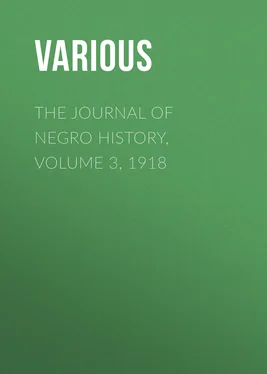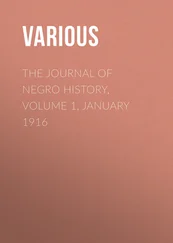Various - The Journal of Negro History, Volume 3, 1918
Здесь есть возможность читать онлайн «Various - The Journal of Negro History, Volume 3, 1918» — ознакомительный отрывок электронной книги совершенно бесплатно, а после прочтения отрывка купить полную версию. В некоторых случаях можно слушать аудио, скачать через торрент в формате fb2 и присутствует краткое содержание. Жанр: foreign_antique, periodic, История, foreign_edu, на английском языке. Описание произведения, (предисловие) а так же отзывы посетителей доступны на портале библиотеки ЛибКат.
- Название:The Journal of Negro History, Volume 3, 1918
- Автор:
- Жанр:
- Год:неизвестен
- ISBN:нет данных
- Рейтинг книги:5 / 5. Голосов: 1
-
Избранное:Добавить в избранное
- Отзывы:
-
Ваша оценка:
- 100
- 1
- 2
- 3
- 4
- 5
The Journal of Negro History, Volume 3, 1918: краткое содержание, описание и аннотация
Предлагаем к чтению аннотацию, описание, краткое содержание или предисловие (зависит от того, что написал сам автор книги «The Journal of Negro History, Volume 3, 1918»). Если вы не нашли необходимую информацию о книге — напишите в комментариях, мы постараемся отыскать её.
The Journal of Negro History, Volume 3, 1918 — читать онлайн ознакомительный отрывок
Ниже представлен текст книги, разбитый по страницам. Система сохранения места последней прочитанной страницы, позволяет с удобством читать онлайн бесплатно книгу «The Journal of Negro History, Volume 3, 1918», без необходимости каждый раз заново искать на чём Вы остановились. Поставьте закладку, и сможете в любой момент перейти на страницу, на которой закончили чтение.
Интервал:
Закладка:
Near the end of his career Henson had many things to trouble him. The divided management of the British American Manual Labor Institute and the saw-mill proved a failure. The trustees who got control of it promised to make something new of it but did not administer the affairs successfully and they were involved in law suits there with the Negroes, who endeavored to obtain control of it. It finally failed, despite the fact that the court of chancery appointed a new board of trustees and granted a bill to incorporate the institution as Wilberforce University, which existed a few years.
Henson showed his patriotism in serving as captain to the second Essex company of colored volunteers in the Canadian Rebellion, going to the aid of the government which gave them asylum from slavery. His company held Fort Maiden from Christmas until the following May and also took the schooner Ann with three hundred arms and two cannons, musketry and provisions for the rebel troops. They held the fort until they were relieved by the colonel of the 44th regiment from England. Then came the Civil War. Henson was too old to go, but his relatives enlisted. He was charged with having violated the foreign enlistment act and was arrested and acquitted after some harrowing experiences.
Henson made a third trip to England near the close of his career. Many of his friends had passed away, but he met his old supporter, Samuel Morley. He made the acquaintance also of Sir Thomas Fowell Buxton Hart, R. C. L. Bevan, and Professor Fowler. But he was then the hero of "Uncle Tom's Cabin." The English people had read of him. They then wanted to see him. He spoke at the Victoria Park Tabernacle and held in London a farewell meeting in Spurgeon's Tabernacle. The buildings were thronged to their utmost capacity and eager crowds on the outside made desperate efforts to see him. He was then called to Scotland that the people farther north might also see this hero. Just as Henson reached Edinburgh the crowning honor of his life was to come. He received a telegram from Queen Victoria inviting him to visit her the following day. After addressing an unusually large audience, Henson proceeded immediately to London. The next day he and his wife were dined by a group of distinguished gentlemen and were then taken to Windsor Castle, where they were presented to Queen Victoria. Her majesty informed him that he had known of him ever since she was a little girl. She expressed her surprise at seeing him look so different from what she had imagined he would. She briefly discussed with him the state of affairs in Canada, and in bidding him and his wife farewell expressed her wish for his continued prosperity, gave him a token of her respect and esteem, consisting of a full length cabinet photograph of herself in an elegant easel frame of gold.
On his return to the United States Henson visited the old plantation in Montgomery County near Rockville, Maryland, finding his old master's wife still living. He then proceeded to Washington to see again the old haunts which he frequented when serving as the market man of his plantation. While in the National Capital he went to the White House to call on his Excellency President Hayes, who chatted with him about his trip across the sea while Mrs. Hayes showed Henson's wife through the executive mansion. When he left the President extended him a cordial invitation to call to see him again. This was the last thing of note in his life. He returned to his home in Canada and resumed the best he could the work he was prosecuting, but old age and sickness overtook him and he passed away in 1881 in the ninety-second year of his life.
W. B. HartgroveELIZABETH BARRETT BROWNING AND THE NEGRO
Elizabeth Barrett Browning was a poetic artist who was intensely concerned with the large human movements of the world and the age into which she was thrown. Her whole life was one great heart-throb. While the condition of her health and the nature of her early training were such as to cultivate her rather bookish and romantic temperament, she followed with eagerness the great social reforms in England in the reign of William IV and the early years of Victoria; and The Cry of the Children and The Cry of the Human indicated what was to be one of her chief lines of interest. In her later years she threw herself heart and soul into the cause of Italian independence and unity, welcoming Napoleon III as a benefactor. Her political judgment was not always sound: her distinguished husband could not possibly follow her in her admiration for Napoleon, whom he regarded as to some extent at least a charlatan, and Cavour simply represented his countrymen in his amazement and chagrin at the terms of the Peace of Villafranca; nevertheless the great heart of Elizabeth Barrett Browning was ever moved by the demands of liberty, whether the immediate impulse was a child in the sweatshops of England, an Italian wishing to be free of Austria, or the exiled Victor Hugo, and there was no exaggeration in the tribute placed on the wall of Casa Guidi after her death:
To such a woman the Negro, held in slavery in a great free republic, made a ready appeal. The first concrete connection, however, was one directly affecting the fortunes of the Barrett family. For some years Mr. Barrett had made his home at a beautiful estate in Herefordshire known as Hope End. He had inherited from his maternal grandfather a large estate in Jamaica, where the families of both his parents had been established for two or three generations. The abolition of slavery in the British colonies in 1833 inflicted great financial embarrassment upon him, as a result of which he was forced to sell Hope End and to remove his family, first to Sidmouth in Devonshire, and subsequently to London. Elizabeth Barrett foreshadowed this change of fortunes in a letter to her friend Mrs. Martin dated Sidmouth, May 27, 1833:
The West Indians are irreparably ruined if the Bill passes. Papa says that in the case of its passing, nobody in his senses would think of even attempting the culture of sugar, and that they had better hang weights to the sides of the island of Jamaica and sink it at once. 9
In September of the same year she wrote from Sidmouth to the same friend as follows:
Of course you know that the late Bill has ruined the West Indians. That is settled. The consternation here is very great. Nevertheless I am glad, and always shall be, that the Negroes are—virtually—free. 10
It is some years before we find another reference so definite. Miss Barrett in the meantime became Mrs. Browning and under the inspiration of love and Italy gave herself anew to her work. The feeling for liberty was constantly with her, as was to be seen from Casa Guidi Windows and Poems before Congress . About 1855, when she was on a visit to England, through the work of Daniel D. Home, a notorious American exponent of spiritualism, Mrs. Browning became interested in the current fad, and gave to it vastly more serious attention than most other initiates. Browning himself, while patient, was intolerably irritated with those whom he regarded as imposing on his wife's credulity, and delivered himself on the subject in Mr. Sludge, 'the Medium .' Spiritualism, however, was a topic of never-failing interest between Mrs. Browning and her American friend, Harriet Beecher Stowe, whom she entertained in Italy. Uncle Tom's Cabin made a profound impression upon her. In 1853 this book was still in the great flush of its first success. On April 12, 1853, Mrs. Browning wrote from Florence to Mrs. Jameson as follows:
Читать дальшеИнтервал:
Закладка:
Похожие книги на «The Journal of Negro History, Volume 3, 1918»
Представляем Вашему вниманию похожие книги на «The Journal of Negro History, Volume 3, 1918» списком для выбора. Мы отобрали схожую по названию и смыслу литературу в надежде предоставить читателям больше вариантов отыскать новые, интересные, ещё непрочитанные произведения.
Обсуждение, отзывы о книге «The Journal of Negro History, Volume 3, 1918» и просто собственные мнения читателей. Оставьте ваши комментарии, напишите, что Вы думаете о произведении, его смысле или главных героях. Укажите что конкретно понравилось, а что нет, и почему Вы так считаете.












